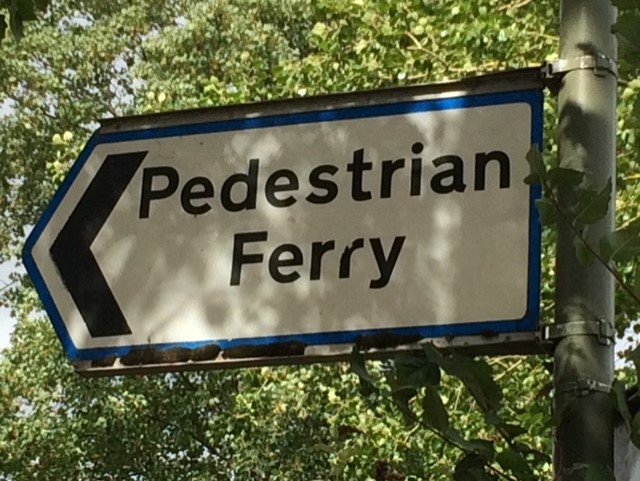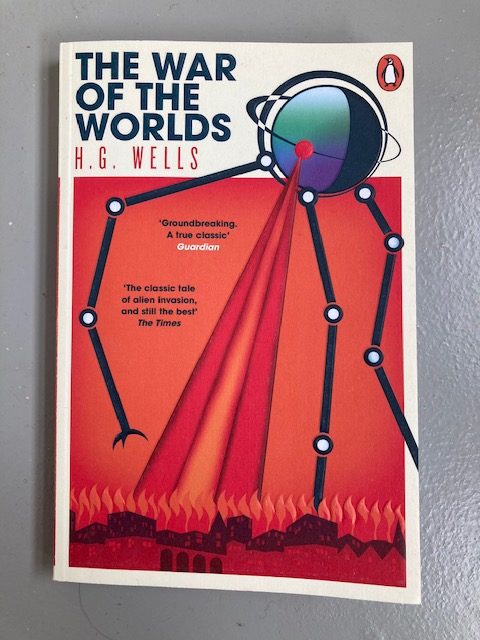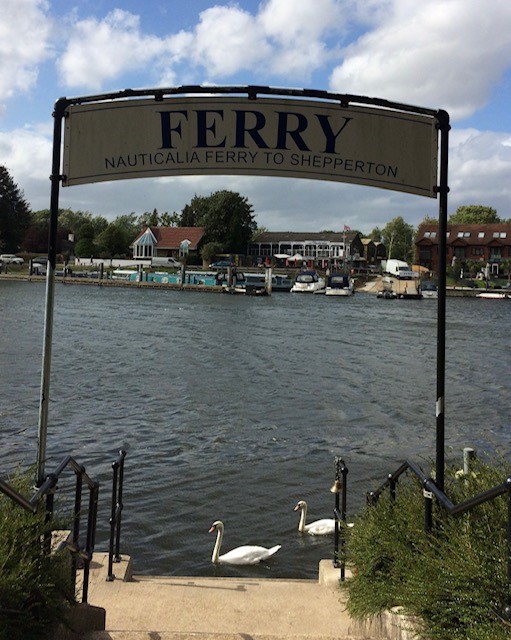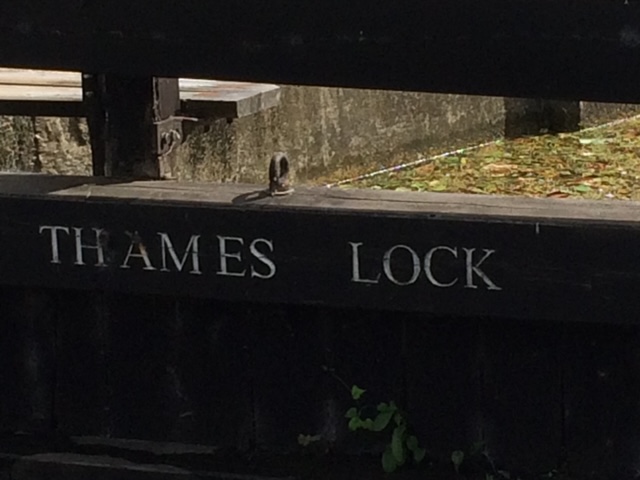Guided by H.G. Wells, Melissa Mouchemore crosses the Thames…or maybe the Wey.

Every now and then people would glance nervously across the Wey, at the meadows towards Chertsey, but everything over there was still…
‘What’s that?’ cried a boatman…
Decanted from the train at Weybridge station, I take off my mask for some air. Despite the August warmth there is a nervous breeze, an uncertain sky. Best to make the most of it all before things change again. Now, which way to the ferry?
I am using the writing of H.G. Wells as my guide. A local at one time, he walked and cycled the ‘towing paths’ of the Thames and Wey regularly. He knew the layout so well that when, in the late 1890s, he decided to set his visionary The War of the Worlds here he was able to move his characters – humans and Martians (his term) – very accurately through the terrain.
In Chapter 12, ‘What I saw of the destruction of Weybridge and Shepperton’, the narrator, fleeing from the advancing aliens, admirably remembers to note exactly where he is;
‘…we found ourselves at the place near Shepperton Lock where the Wey and Thames join…The Wey has a treble mouth, and at this point boats are to be hired, and there was a ferry across the river.’
I just have to find the spot. It is not so easy; since Wells’s time London has relentlessly pushed the boundaries. He would have known water meadows where now there are cul-de-sacs and crescents, wedding boutiques and pizzerias.
Even once I find the water it is not immediately clear which waterway I am on. On Thames Street beyond a boatyard there is a wide channel, boats moored, land opposite, a two-tiered weir sieving the water with a hiss. But is that the far bank or one of the islands on this reach? The Wey? The Thames? Perhaps it was this confusing geography that appealed to Wells; the perfect labyrinth in which to entrap his fellow Surrey dwellers.
Several socially-distanced directions later and finally, where the river is at its broadest, some steps and a sign;
FERRY RUNS EVERY 15 MINUTES ON THE QUARTER HOUR. IF REQUESTED. PLEASE RING THE BELL HARD FOR 10 RINGS.
And there is the bell – bright brass on a heavy chain wrapped around the railing.

I head towards it and consider making a clanging that will travel across the water. A woman walker hails me;
‘Really give it welly!’’
I manage one firm clang and before I go on, a figure on the far bank is already climbing on board a launch. It is near the quarter hour.
I wait on a step in the sun. By the landing stage a wind generator on a moored cruiser spins merrily, and nasturtiums splash along a narrowboat roof. A parakeet squeaks as if pressed by a child. Mallards nonchalantly bob over the water’s wrinkles. It is peaceful, it is contented: the famed idyll of the upper Thames.
Wells gleefully dropped hellfire onto it all, the earliest mass attack happening right here. He had first discussed the plot with his brother; what would happen, they wondered, if Martians did to Britain what Britain had done to the indigenous Tasmanians? He would not be able to spare anyone, not the ‘respectable inhabitants’ in their ‘golf and boating costumes’ not the ‘riverside loafers’ and not the ‘worthy vicar’.
As the son of a lady’s maid and shopkeeper, Wells was known for his realistic and empathetic portrayals of ordinary working people and in The War of the Worlds, here they are thronging the river’s edge, imagined in the most extraordinary circumstances. One old man is arguing with a soldier that he has to take his orchids which are ‘vallyble’. A couple are struggling between them to carry their household goods piled on an outhouse door. And one man clearly confident in the might of the British field guns and the Victorian transport system is declaring that he is going to cross by boat to catch a train from Shepperton station. Roused by the army to evacuate there are ‘more people than boats,’ even though every rowing boat and ‘the big ferry-boat’ have been commandeered, all rowing and possibly steaming back and forth, ferrying those instinctively taking refuge on the Shepperton side.
They put their trust in the river as a moat. How were they to know it would just be a ditch to the invaders?

The ferry is gliding up to the landing stage now and a blue-jumpered ferryman nods a greeting. Did I want a return? I explain my walking route to Walton station. I am coming the wrong way then, he happily points out, and describes the route I should be taking. A return then please. I hesitate as I work out the sequence; hand sanitize, exchange coins for ticket, hand sanitize. It is the first time I have used coins since March. It had to be a ferryman.
It is a ‘man in a blue jersey’, so possibly a ferryman, who finally spots the armoured Martians powering on their stork-like metallic legs high over the landscape towards them;
‘Yonder! D’yer see them? Yonder!’
And the crowd is so horror-struck there is silence.
Until all hell breaks loose, the deadly Heat Ray is unleashed and the ferry is of no more use, boats not knowing which bank to head towards, people leaping out into the water, their entry ‘sounding like thunderclaps’. It is unlikely anyone made the 12.42 to Waterloo.
My crossing is thankfully uneventful and on the Shepperton bank I follow the ferryman up to the chandlery and cafe where the outdoor tables are busy with people intent on Eating Out To Help Out.
An older couple with a pot of tea and dogs at their side had watched me walk up from the ferry. The woman accosts me now.
‘Excuse me, what is on that island?’ she points over the river to where I rang the bell.
I wonder what she means for a moment and then have to break it to her;
‘Well, it’s just Weybridge.’
But I hardly know which way I am facing as the ferryman has already discovered, and after my cup of tea one of his colleagues readily sells me a map in the shop.

The surrounding area may be so much more built up than in Wells’s time but it cannot have changed so greatly out on the river. On the return crossing I start to get my bearings. Downstream, the Thames splits to clasp the teardrop of D’Oyly Carte island. Swimmers are circling it now — their line of travel marked out by pale arms flashing in the green water and bright orange safety floats trailing behind. The water looks soothing; its surface has the slick, slightly greasy quality of a salve or ointment.
When the ferries are of no more use in the flight from the Martians the only salvation is the Thames. The narrator shouts to everyone to get under the water as the deathly Heat Ray incinerates all in its path, melting houses, blazing trees and ‘licking off the people who ran this way and that’. He soon discovers that the water, far from being soothing, rises to near boiling point where the Heat Ray sweeps across it. But he has no choice. Despite a traumatic scalding he is still impressively geographically accurate as he crawls ‘with parboiled hands’ onto ‘a broad, bare, gravelly spit that runs down to mark the angle of the Wey and the Thames.’ I am looking across at such an angle now. Upstream I see the whole ‘treble mouth’; the junctions of the Wey, the Wey Navigation and the Thames, the lock, the weir, exactly where the islands sit and what the options are should the Martians pay a return visit. And with my map I also have the Martian’s eye-view of the riverscape they scissored over, leaving upturned boats, sizzling water, charred remains and thick black smoke in their wake. They miss the narrator lying on the gravel spit – they have the rest of the world to destroy.
Back on the Weybridge bank, the ferryman makes sure I now know the route to Walton and points the way. I leave him wiping down surfaces with the anti-bac spray.
A stiffening breeze is agitating the trees all around me as I climb the steps onto the tow path. Conker cases, pale green and spiked like maces, detonate as they hit the ground. Summer is losing its grip.

Wells, with his biologist’s background and knowledge of the desperate fate of the indigenous Tasmanians, understood how he could end the Martians’ rule. However good their over-evolved brains at space travel, the Martian body has no herd immunity to a tiny virus; after much incinerating, they all eventually keel over in their armoured machines.
But there is no simple ending – that is the genius of Wells. He leaves us understanding that nothing will ever be the same again. Even though the narrator ends up back in his old study in Surrey he is wracked by what would now be diagnosed as PTSD. And the scientists constantly scan the skies for further Martian action. The narrator tries to make sense of it all, the huge scientific knowledge gained, the promotion of the ‘commonweal of man’ and the loss of ‘that serene confidence in the future which is the most fruitful source of decadence.’
With science, imagination, co-operation and humility, we could keep progressing; that was Wells’s hope. In his writing, he showed us the way.
Bikes crackle on the gravel behind me; a bubble of parents and children. The ferry is bringing some dog walkers across – perhaps the couple from the café are venturing to the Island of Weybridge for the first time? I haven’t heard the bell again. The watchful ferryman always seems to get there first.